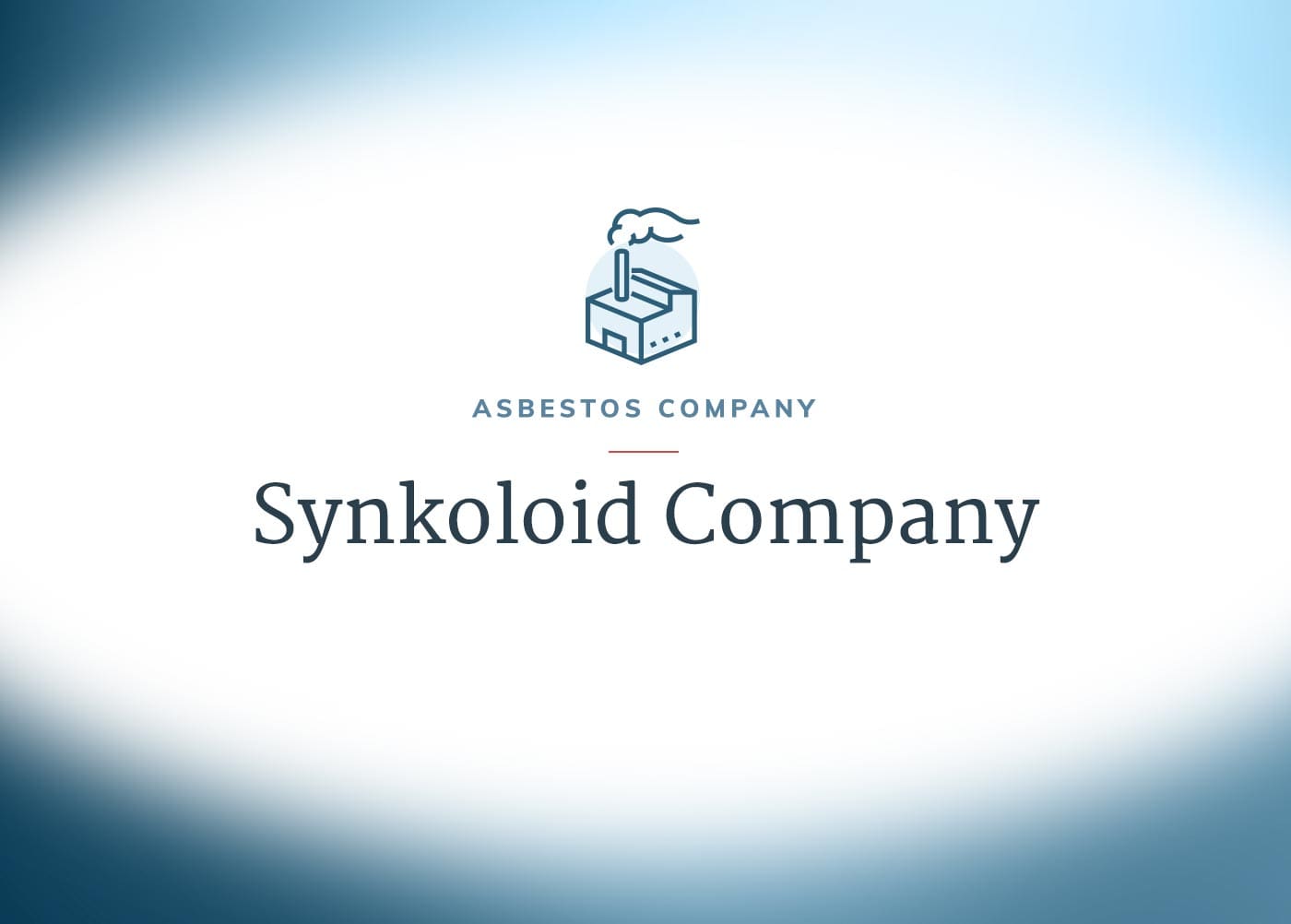01. History of Asbestos Use
Synkoloid Company History of Asbestos Use
Synkoloid Company was founded in 1894 in New Jersey. At its founding, the company produced paint, wood finishes and spackling paste. Synkoloid used asbestos in these products beginning in 1949. The mineral was added to these products due to its ability to increase heat- and fire-resistance, durability and strength.
In 1975, when Synkoloid was beginning to phase out its use of asbestos, the company was acquired by Artra Group, Inc. At the time of sale, Artra Group, Inc. assumed responsibility for all of Synkoloid’s post-1962 liabilities, including asbestos liabilities.
Certain Synkoloid products, including Kool-Kap, Vinyl Tex-Wall and Plastibond, continued to be made with asbestos fibers under Artra Group, Inc. All Synkoloid products were asbestos-free after March 1976.
Artra Group, Inc. owned and operated Synkoloid as a division of the company from 1975 until 1981, when the Muralo Company, Inc. acquired Synkoloid. While owned by the Muralo Company, no Synkoloid products contained asbestos.
The Muralo Company owned all Synkoloid assets until 2014, when PaintSolutions acquired Synkoloid’s patch and repair product line. Today, PaintSolutions continues to manufacture and sell Synkoloid products internationally.
Resources for Mesothelioma Patients
02. Asbestos Products
Synkoloid Company Asbestos Products
Synkoloid Company products were asbestos-free from the company’s founding in 1894 until 1949. At this time, the company began incorporating asbestos into its Tex-Wall and EZE-Tex products. Synkoloid manufactured asbestos-containing products through March 1976.
Like other asbestos manufacturers, Synkoloid Company used the mineral as a cheap additive to increase product durability, strength and resistance to heat and fire.
Today, all products produced and manufactured under the Synkoloid brand are asbestos-free.
| Product Name | Start Year | End Year |
|---|---|---|
| Tex-Well | 1949 | August 1975 |
| EZE-Tex | 1949 | September 1975 |
| Synko-Topping | 1950 | September 1975 |
| Triple Duty Joint Compound | 1950 | July 1975 |
| Prime ‘N Fill | 1960 | September 1975 |
| Snohide | 1962 | March 1975 |
| Plastibond | 1950 | March 1976 |
| Surface Conditioner | 1950 | March 1976 |
| Vinyl Prep Mix | 1962 | December 1975 |
| Flexi Patch | 1960 | March 1976 |
| Stucco & Cement Patch | 1950 | October 1975 |
| Tex-Add | 1950 | December 1975 |
| Kool-Kap | 1965 | January 1976 |
| Vinyl Tex-Wall | 1972 | January 1976 |
| Vinyl Prime ‘N Fill | ~January 1976 | |
| Vinyl Roof Paint | January 1976 |
03. Occupational Exposure
Synkoloid Company and Occupational Exposure
Synkoloid Company’s asbestos use spanned decades. Any employees who worked for the company, or used the company’s asbestos-containing products, may have experienced occupational asbestos exposure.
The company recognizes more than 1,000 occupations that may have been exposed to its asbestos products. Workers in these fields between 1949 and 1976 may have used Synkoloid asbestos-containing products on jobsites.
Workers may still be exposed to the company’s asbestos products when completing demolition projects in older homes, schools and public buildings
04. Asbestos Litigation
Asbestos Litigation Against Synkoloid Company
Synkoloid was a division of Artra Group, Inc. from 1975 until 1981 when the Muralo Company, Inc. acquired the assets of the company. It was around this time that Artra Group, Inc. and other asbestos companies began to be named in lawsuits stemming from previous asbestos use. Despite selling Synkoloid’s assets, Artra Group, Inc. remained liable for Synkoloid’s asbestos litigation. If you believe you or a loved one was exposed, learn how a mesothelioma lawyer can help.
In June 2002, the increasing number of asbestos claims naming Artra Group, Inc. forced the company to file for Chapter 11 bankruptcy. Once Artra Group, Inc. entered bankruptcy, the Muralo Company started being named in asbestos claims.
By 2003, the Muralo Company had been named in asbestos lawsuits filed by more than 60,000 claimants. As a result, the company filed for Chapter 11 bankruptcy that year.
One such lawsuit filed against Synkoloid during these bankruptcy proceedings involved a self-employed contractor. John Pace worked as a contractor in Corpus Christi, Texas during the 1960s and 1970s. He frequently used Synkoloid asbestos products, most commonly the company’s Triple Duty Joint Compound. Pace was later diagnosed with asbestosis.
Following a trial, a jury awarded Pace:
- $525,000 for past and future mental anguish and physical suffering
- $1.5 million for future medical care
Today, Synkoloid Company’s asbestos-related lawsuits are paid through a trust fund formed with money from both Artra Group, Inc. and the Muralo Company.
05. Asbestos Trust Fund
Synkoloid Company Asbestos Trust Fund
The current payment percentage for successful claims is 0.5%.
In 2007, Artra Group, Inc. and the Muralo Company partnered to form a trust fund to compensate asbestos victims impacted by Synkoloid Company’s asbestos use. The asbestos trust fund formed as part of the Artra Group, Inc.’s reorganization plan from bankruptcy and was initially funded with $74 million.
In an effort to address its own Synkoloid-related legal issues, the Muralo Group contributed $2.5 million to the ARTRA Asbestos Trust.
The trust began accepting claims on November 1, 2007. Claimants who successfully file against the trust are currently compensated at a 0.5% payment percentage. Trusts operate with a payment percentage to ensure adequate funds for future claimants. However, claimants may receive higher payouts on a case-by-case basis. Larger awards may be granted due to age, exposure, asbestos cancer type and firm settlement history.
The ARTRA Asbestos Trust continues to accept claims and pay out successful claimants today.




